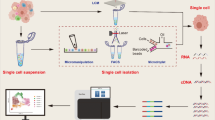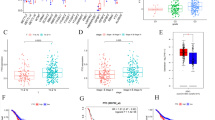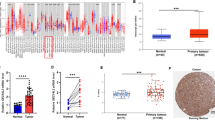Abstract
Background
Esophageal squamous cell carcinoma (ESCC) is one of the most common causes of cancer mortality in the gastrointestinal tract. Promoter hypermethylation of tumor suppressor genes contributes to gene inactivation during development of ESCC.
Aim
To identify novel methylation-silenced genes in ESCC.
Methods
Genome-wide microarrays were applied to search for genes that were markedly upregulated after treatment with 5-aza-2′-deoxycytidine (5-Aza-dC) and that were markedly decreased in tumor tissue compared with paired adjacent nontumor tissue. Reverse-transcription polymerase chain reaction (PCR), immunohistochemistry, methylation-specific PCR, and bisulfite genomic sequencing were employed to investigate expression and methylation of candidate genes in five human ESCC cell lines, two human immortalized normal esophageal epithelial cell lines, primary ESCC tumor tissues, and paired adjacent nontumor tissues.
Results
GPX3 was selected as a novel candidate hypermethylated gene in ESCC through microarray analysis. In most ESCC cell lines, GPX3 messenger RNA (mRNA) expression was downregulated and the CpG island of GPX3 promoter was methylated. Demethylation treatment with 5-Aza-dC restored GPX3 mRNA expression. Methylation of GPX3 promoter was more frequent in ESCC tumor tissues (71.4%) than in adjacent nontumor tissues (10.7%) (P < 0.001), and methylation of GPX3 promoter correlated significantly with GPX3 mRNA downregulation. Finally, GPX3 protein expression was also significantly lower in ESCC tumor tissues than in adjacent nontumor tissues.
Conclusion
GPX3 is downregulated through promoter hypermethylation in ESCC, which may be a potential biomarker of ESCC.




Similar content being viewed by others
Abbreviations
- ESCC:
-
Esophageal squamous cell carcinoma
- GPX3:
-
Glutathione peroxidase 3
- UCHL1:
-
Ubiquitin carboxyl-terminal esterase L1
- TSPYL5:
-
TSPY-like 5
- PPP1R14A:
-
Protein phosphatase 1 regulatory (inhibitor) subunit 14A
- DLC1:
-
Deleted in liver cancer 1
- 5-Aza-dC:
-
5-Aza-2′-deoxycytidine
- ECRG4:
-
Esophageal cancer related gene 4 protein
- APC:
-
Adenomatous polyposis coli
- HPP1:
-
Hyperplastic polyposis protein 1
- RT-PCR:
-
Reverse-transcription PCR
- GAPDH:
-
Glyceraldehyde-3-phosphate dehydrogenase
- MSP:
-
Methylation-specific PCR
References
Parkin DM, Bray F, Ferlay J, Pisani P. Global cancer statistics, 2002. CA Cancer J Clin. 2005;55:74–108.
Hanahan D, Weinberg RA. The hallmarks of cancer. Cell. 2000;100:57–70.
Ponder BA. Cancer genetics. Nature. 2001;411:336–341.
Li LW, Yu XY, Yang Y, Zhang CP, Guo LP, Lu SH. Expression of esophageal cancer related gene 4 (ECRG4), a novel tumor suppressor gene, in esophageal cancer and its inhibitory effect on the tumor growth in vitro and in vivo. Int J Cancer. 2009;125:1505–1513.
Salam I, Hussain S, Mir MM, et al. Aberrant promoter methylation and reduced expression of p16 gene in esophageal squamous cell carcinoma from Kashmir valley: a high-risk area. Mol Cell Biochem. 2009;332:51–58.
Zhao BJ, Tan SN, Cui Y, Sun DG, Ma X. Aberrant promoter methylation of the TPEF gene in esophageal squamous cell carcinoma. Dis Esophagus. 2008;21:582–588.
Seng TJ, Low JS, Li H, et al. The major 8p22 tumor suppressor DLC1 is frequently silenced by methylation in both endemic and sporadic nasopharyngeal, esophageal, and cervical carcinomas, and inhibits tumor cell colony formation. Oncogene. 2007;26:934–944.
Yu J, Tao Q, Cheung KF, et al. Epigenetic identification of ubiquitin carboxyl-terminal hydrolase L1 as a functional tumor suppressor and biomarker for hepatocellular carcinoma and other digestive tumors. Hepatology. 2008;48:508–518.
Oka D, Yamashita S, Tomioka T, et al. The presence of aberrant DNA methylation in noncancerous esophageal mucosae in association with smoking history: a target for risk diagnosis and prevention of esophageal cancers. Cancer. 2009;115:3412–3426.
Laird PW. The power and the promise of DNA methylation markers. Nat Rev Cancer. 2003;3:253–266.
Jones PA, Baylin SB. The fundamental role of epigenetic events in cancer. Nat Rev Genet. 2002;3:415–428.
Jee CD, Kim MA, Jung EJ, Kim J, Kim WH. Identification of genes epigenetically silenced by CpG methylation in human gastric carcinoma. Eur J Cancer. 2009;45:1282–1293.
Milde-Langosch K, Bamberger AM, Rieck G, Kelp B, Löning T. Overexpression of the p16 cell cycle inhibitor in breast cancer is associated with a more malignant phenotype. Breast Cancer Res Treat. 2001;67:61–70.
Yu YP, Yu G, Tseng G, et al. Glutathione peroxidase 3, deleted or methylated in prostate cancer, suppresses prostate cancer growth and metastasis. Cancer Res. 2007;67:8043–8050.
Peng DF, Razvi M, Chen H, et al. DNA hypermethylation regulates the expression of members of the Mu-class glutathione S-transferases and glutathione peroxidases in Barrett’s adenocarcinoma. Gut. 2009;58:5–15.
Lee OJ, Schneider-Stock R, McChesney PA, et al. Hypermethylation and loss of expression of glutathione peroxidase-3 in Barrett’s tumorigenesis. Neoplasia. 2005;7:854–861.
Kashyap MK, Marimuthu A, Kishore CJ, et al. Genomewide mRNA profiling of esophageal squamous cell carcinoma for identification of cancer biomarkers. Cancer Biol Ther. 2009;8:36–46.
Wang JY, Yang IP, Wu DC, et al. Functional glutathione peroxidase 3 polymorphisms associated with increased risk of Taiwanese patients with gastric cancer. Clin Chim Acta 2010 May 27. [Epub ahead of print].
Acknowledgments
This work was supported by National ‘863’ High-tech Program Grant in China (2007AA02Z4Z4), China Postdoctoral Science Foundation (20090460394), and Beijing Municipal Natural Science Foundation (7072022).
Conflict of interest
There is no conflict of interest.
Author information
Authors and Affiliations
Corresponding author
Rights and permissions
About this article
Cite this article
He, Y., Wang, Y., Li, P. et al. Identification of GPX3 Epigenetically Silenced by CpG Methylation in Human Esophageal Squamous Cell Carcinoma. Dig Dis Sci 56, 681–688 (2011). https://doi.org/10.1007/s10620-010-1369-0
Received:
Accepted:
Published:
Issue Date:
DOI: https://doi.org/10.1007/s10620-010-1369-0




